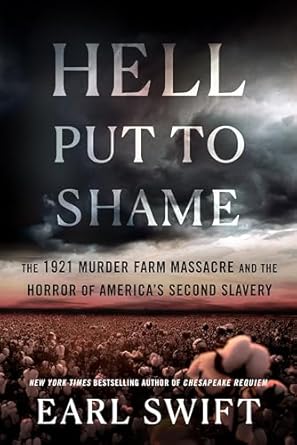Discover the haunting truth behind one of America’s darkest chapters with “Hell Put to Shame: The 1921 Murder Farm Massacre and the Horror of America’s Second Slavery.” This compelling narrative nonfiction from New York Times bestselling author dives deep into the brutal murder of eleven Black farmhands on a Georgia plantation, shedding light on the insidious practice of peonage that persisted long after the Civil War. With gripping storytelling, the book unearths a chilling history that many would prefer to forget, revealing the systematic erasure of these crimes from our collective memory.
As you turn the pages, you’ll meet remarkable figures like James Weldon Johnson and Walter F. White, who bravely challenged the status quo and fought for justice in a world where violence against Black individuals often went unpunished. “Hell Put to Shame” is not just a historical account; it’s a powerful reminder of the racial struggles that continue to resonate today. Engage with this vital piece of American history and join the conversation about race, justice, and the enduring impact of slavery in modern society.
Hell Put to Shame: The 1921 Murder Farm Massacre and the Horror of America’s Second Slavery
Why This Book Stands Out?
- Uncovered History: “Hell Put to Shame” reveals the chilling and often overlooked story of the 1921 Murder Farm Massacre, shedding light on a brutal chapter in American history that continues to resonate today.
- Powerful Narrative: This gripping narrative nonfiction combines elements of police procedural, courtroom drama, and political exposé, making it an engaging read that keeps you on the edge of your seat.
- Illuminating Peonage: The book provides a stark exploration of peonage, a form of slavery that persisted after the Civil War, challenging the notion that involuntary servitude ended with the abolition of slavery.
- Remarkable Figures: Readers are introduced to inspiring individuals like James Weldon Johnson and Walter F. White, who bravely fought against systemic racism and injustice, highlighting the power of activism and resilience.
- Timely Relevance: As the nation grapples with ongoing issues of race and justice, the historical parallels drawn in this book make it not only a compelling read but also a vital contribution to contemporary discussions.
- Acclaimed Author: Written by the bestselling author of “Chesapeake Requiem,” this book is backed by a strong reputation for thorough research and captivating storytelling.
Personal Experience
As I delved into Hell Put to Shame, I found myself grappling with a mix of emotions—anger, sadness, and a profound sense of reflection. This book is not just a recounting of historical events; it’s a visceral reminder of the struggles endured by countless individuals in the face of brutal oppression. The narrative resonates deeply, stirring feelings that many of us can relate to, whether through personal stories or broader societal issues.
Reading about the tragic fate of those eleven Black farmhands, I couldn’t help but think about the importance of remembering our history, no matter how uncomfortable it may be. It prompts us to consider our own experiences with injustice and the ways we might have witnessed or participated in systems that perpetuate inequality. Here are a few insights that struck me personally:
- Confronting Uncomfortable Truths: The book challenges us to confront the uncomfortable realities of our past. Many of us have had moments where we’ve stumbled upon truths about our families or communities that were difficult to accept. This narrative invites us to engage with those truths instead of turning away.
- Empathy for Others: As I read about the individuals involved in this tragic event, I felt a growing sense of empathy. Stories like these remind us that behind historical events are real people with hopes, dreams, and families. Reflecting on this can inspire us to connect with the struggles of others in our own lives.
- The Importance of Advocacy: The efforts of James Weldon Johnson and Walter F. White are particularly inspiring. Their commitment to justice encourages us to consider our roles in advocating for change. Have we ever stood up for someone facing injustice? This book ignites that desire to be an ally and to take action in our communities.
- History’s Relevance: The themes of race and justice are as relevant today as they were in the early 20th century. Many readers may find parallels between the struggles depicted in the book and contemporary issues, prompting self-reflection about our own beliefs and actions in today’s society.
In sharing this journey through Hell Put to Shame, I encourage you to embrace the emotional weight it carries. It’s a powerful reminder of our collective history and the ongoing fight for justice and equality. Each page offers a chance to reflect on personal experiences and the broader societal implications of the past, making it a truly engaging read.
Who Should Read This Book?
If you have a keen interest in history, social justice, or the complexities of race relations in America, then Hell Put to Shame is a must-read for you. This book dives deep into a harrowing yet crucial episode in American history that often gets overlooked. Here’s why it’s perfect for you:
- History Enthusiasts: If you love uncovering the untold stories that shape our past, this book offers a gripping narrative that sheds light on a dark chapter of American history—the mass killing of Black farmhands in 1921 and the systemic peonage that followed the Civil War.
- Social Justice Advocates: For those who are passionate about fighting for equality and justice, this book provides historical context that is essential for understanding the roots of contemporary racial issues. It showcases the courage of individuals who stood up against oppression.
- Students of American Culture: If you’re studying sociology, history, or cultural studies, this book serves as an important case study on the enduring legacy of slavery and the ongoing struggle for civil rights.
- Readers of True Crime and Narrative Nonfiction: Fans of true crime will find the investigative aspect of the book compelling, as it reads like a police procedural that uncovers not just a crime but a broader societal injustice.
- Those Seeking Understanding: If you’re looking to gain a deeper understanding of America’s racial dynamics and the historical context behind them, this book provides the insights necessary to engage thoughtfully in these discussions.
By reading Hell Put to Shame, you’re not just absorbing facts; you’re connecting with the past in a way that informs your understanding of the present. This book brings a unique blend of storytelling, history, and critical analysis that makes it an invaluable resource for anyone interested in the ongoing journey toward justice and equality.
Hell Put to Shame: The 1921 Murder Farm Massacre and the Horror of America’s Second Slavery
Key Takeaways
Hell Put to Shame offers readers a profound exploration of a dark chapter in American history, shedding light on the brutal reality of peonage and the systemic injustices faced by Black individuals in the early 20th century. Here are the key insights and lessons from the book:
- Uncovering Historical Injustice: The book presents a chilling account of the 1921 murder of eleven Black farmhands, highlighting the brutal realities of peonage and the continuity of slavery-like conditions in post-Civil War America.
- Collective Memory and Erasure: It addresses the deliberate efforts to erase these horrific events from national consciousness, prompting readers to reflect on the importance of remembering and acknowledging historical injustices.
- Profiles of Courage: Readers will meet remarkable figures like James Weldon Johnson and Walter F. White, who fought against systemic racism and worked tirelessly to expose the truth behind the murders and the broader issue of debt slavery.
- Relevance to Modern Issues: The narrative draws connections between the past and present, illustrating how the challenges of race and justice continue to resonate in contemporary society.
- Multi-Genre Approach: Combining elements of police procedural, courtroom drama, and political exposé, the book delivers a compelling and engaging narrative that keeps readers invested.
- Call to Action: By revealing the historical context of racial violence and injustice, the book encourages readers to confront and challenge ongoing societal issues related to race and equity.
Final Thoughts
“Hell Put to Shame: The 1921 Murder Farm Massacre and the Horror of America’s Second Slavery” is a compelling and essential read that sheds light on a dark chapter of American history that often goes unacknowledged. Through meticulous research and vivid storytelling, the author unveils the tragic tale of eleven Black farmhands whose lives were cut short, exposing the insidious reality of peonage—an exploitative practice that persisted long after the abolition of slavery. This gripping narrative not only recounts the events of the 1921 massacre but also examines the broader implications of racial violence and systemic injustice that resonate to this day.
This book is not just a recounting of historical events; it serves as a powerful reminder of the ongoing struggle for racial equality and justice in America. The stories of the individuals who fought for accountability and change, such as James Weldon Johnson and Walter F. White, inspire readers to reflect on the importance of activism and the relentless pursuit of truth. The narrative intertwines elements of police procedural, courtroom drama, and political exposé, making it a multifaceted read that appeals to a wide audience.
- Uncovers a forgotten episode of racial violence in America.
- Highlights the historical context of peonage and its modern relevance.
- Features courageous figures who challenged systemic oppression.
- Engages readers with a blend of storytelling and historical analysis.
Whether you’re a history enthusiast, a social justice advocate, or simply looking for a thought-provoking read, “Hell Put to Shame” is a valuable addition to any collection. It encourages us to confront uncomfortable truths and consider the legacies we inherit. Don’t miss the opportunity to explore this significant work—purchase your copy today and join the conversation about race, justice, and history. Get your copy now!





